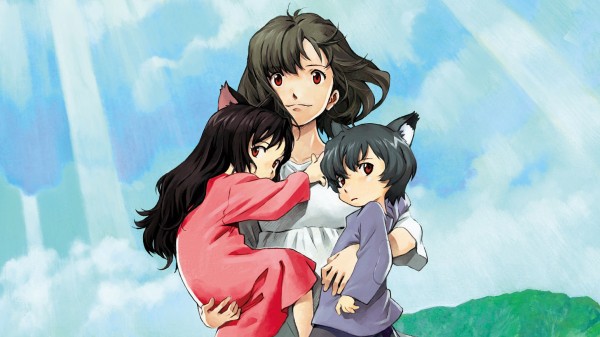
Studio Chizu’s award winning animated film Wolf Children is screening throughout Australia this month. Thanks to Madman Entertainment and the Japan Foundation I was able to sit down with the director of Wolf Children himself Mamoru Hosoda to discuss the film itself, his thoughts on film-making, Studio Chizu, what he would like to adapt into a film and much more. Read on for our interview with this remarkable film-maker.
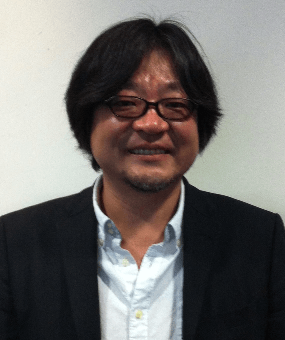
CC: First of all I just want to say, Wolf Children is an incredible film. I found it to be very thought-provoking. I’m wondering what is your philosophy on film-making and what do you set out to achieve when making a film?
Hosoda: If you look at the films I have made, The Girl Who Leapt Through Time involves time-travel, Summer Wars involves a kind of cyber-punk mind-set and with Wolf Children it involves a wolf man. So there is something to do with sci-fi or horror in all the films I have done so far, but I’m actually not really looking specifically to that.
It is more to do with everyday life slipping into a different feel or a different understanding. I think that’s what I’m really interested in.
CC: I’ve also got to congratulate you on the success of Wolf Children. It has won the Japan Academy Prize for Animation and it has also reached a global audience including right here in Australia. How do you feel about such recognition for your film?
H: The film is set in rural Japan but in many many ways I feel this film has a very ubiquitous quality that lends itself to the world. Everyone has a mother – the film is about child-rearing – a mother looking after her children. Everyone can remember their own childhood, so with that I feel there is something about this film that actually translates to the world very easily and readily.
CC: So would you consider this a family film?
H: I guess a lot of fathers and sons, mothers and daughters and of course children, went to see this film – as well as boyfriends and girlfriends who could possibly imagine what it would be like to get married, settle down and have kids. In some ways it is a family film but I think it actually has something a bit broader than that going for it.
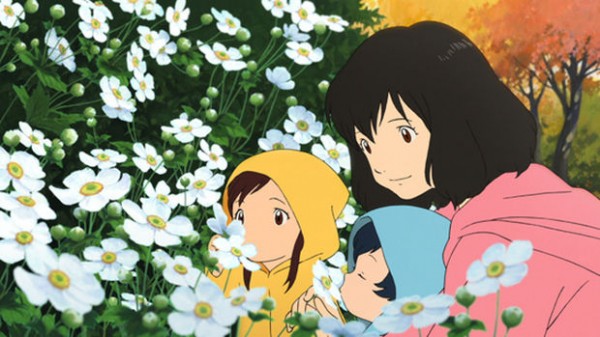
CC: I actually watched this film with my own family. I found it interesting that we each related to different characters. Was it your intention to make this film relatable on multiple different levels?
H: It is good that everyone relates to different characters. The main character is obviously Hana the mother, so that is one way of looking at it. But for younger audiences I’d like them to see it as Ame and Yuki growing up and the choices that they make, whether they return to nature, embrace civilization or what kind of compromise they come to with these sorts of things.
It is very good that the film can invite people to have different investments with the characters. So which character did you relate to?
CC: I actually related most to Ame.
H: I can understand that. Here we are talking about a movie, you must have run off like Ame! [Laughs]
CC: I must say, this feels like a very personal film. Could you please tell us what inspired this particular story?
H: What I wanted to do was make a film about child-rearing. If you look at the history of film, there actually aren’t many films to do with child-rearing. Partly because there isn’t anything inherently cinematic about that I guess. So I waited for something that I could hang child-rearing on.
I happened to meet a young mother who likened her children to having monsters and wild animals in the house. I thought that it was actually very good and wondered what if it wasn’t just a metaphor, what if the character actually was raising wild animals in the house, that might be fun. So that’s how it came to be the way it is.
CC: So this is where the idea of the wolves came from?
H: Yes it is. Do you have this metaphor in Australia that young children are like monsters?
CC: Yes we do. I think everywhere has it – the whole world. [Laughs]
H: [Laughs] I see!
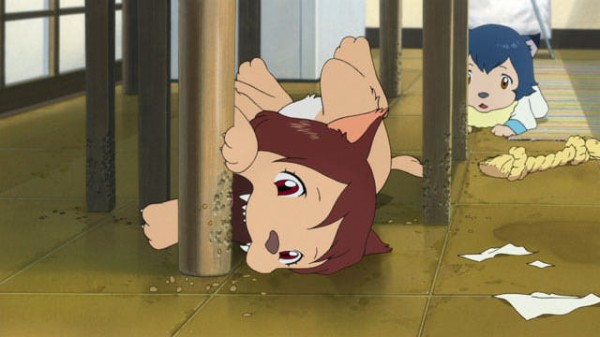
CC: Like many of your films, Wolf Children has a female protagonist. What is it about female protagonists that interests you so much?
H: I think it is because the life of women offers up many life choices that can become subjects for films. You look at the life of a man, most of the time it is about winning and losing. You win this, you lose that, but you come back and win. But a woman actually has very concrete choices to make, like who will they marry, will they have children, do they stay in the workplace. The life choices that come up actually offer themselves up as very interesting for film.
CC: This is a very beautiful film. It has a very distinct art style, much like that seen in your other films. How important do you feel the art style is to an anime film or anime series?
H: That is animation by its very nature, everyone draws and paints what they think is beautiful. It’s there inevitably, nothing ends up there by accident. What ends up there is what everyone thinks is beautiful. We spend a lot of time drawing these things, so the reason the beautiful things come to the forefront is because we are all so invested in the process. I have to tell you, we draw a lot of drawings. I don’t think we could do it if we were aiming at ugliness. We sit around a desk for 3 years just drawing away. [Laughs]
CC: So was this film mostly hand-drawn, was there CG or photography used?
H: We value the lines and the sense of analog drawing very highly, so that was the first thing we had to get under control. If you look at the CG we did for this film, it is actually using a fair amount of computing power to generate a hand-drawn feel in sequences that involve trees swaying in the wind or grass moving in the breeze. These kind of things we actually applied a lot of computer graphics to make it look like hand-drawn images.
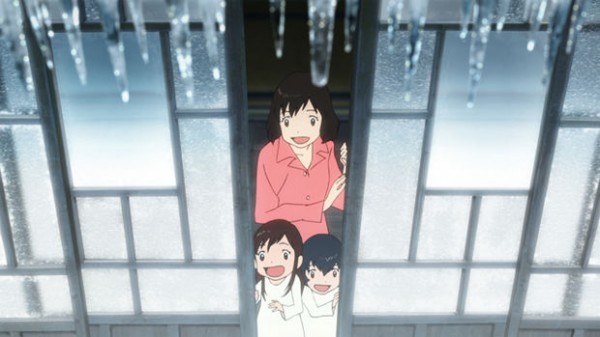
CC: In 2011 you left Madhouse to form Studio Chizu. Has forming your own studio always been a goal of yours? What led to this decision?
H: The reason I set up Studio Chizu is because I came to a realization that if you actually want to make feature-length theatrical animations you have to have a dedicated outfit to do that and that alone. The business of doing television series and commercials with some feature films in a our spare time just wasn’t going to work for me. So I created Studio Chizu specifically to do theatrical animation films. But it is easier said than done obviously, because if your film doesn’t return the investment we really can’t continue. If any moment a film fails, our company is doomed. But until I do I intend to keep continuing this way.
CC: What do you feel sets Studio Chizu apart from other anime studios?
H: I think what sets it apart is that it is the worlds smallest animation studio with only 5 people working there right now! [Laughs] Of course during projects we grow to 300 but after that we shrink back down to 5 people. Our office is actually smaller than this room we are in now, it might even be a third of the size! This is what sets us apart. [Laughs]
CC: That would certainly make you different. Wolf Children has been compared to the works of Studio Ghibli. How do you feel about such a comparison?
H: I get this a lot. I have to say, we are not rivals at all. We actually get along very well with their office. Our producer Saito-san goes across and gets advice all the time – I don’t. [Laughs] But yes we get along very well, there is a lot of interaction between our staff and their staff.
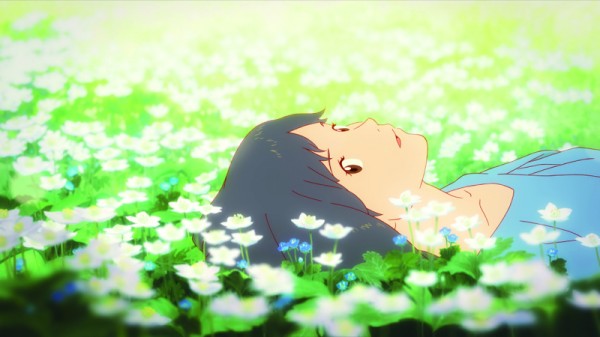
CC: In the past you have directed films based upon popular franchises like Digimon and One Piece. Do you eve consider doing another film based on a franchise like this?
H: When I made those franchise pictures I learnt a lot about film-making. I would consider doing one of those again if they presented themselves to me as an opportunity to make a good film or if I would have an opportunity to learn even more things doing those particular kinds of projects.
CC: Is there any franchise out there you’d love to make a film of?
H: It is hard to think of, can you think of anything? [Laughs]
CC: Do you know the series Hunter x Hunter?
H: Yes, Hunter x Hunter!
CC: I’d love to see a Mamoru Hosoda Hunter x Hunter film.
H: The tough thing about franchise pictures is that often someone has already beaten you to the punch. Unfortunately they have already made a Hunter x Hunter film. But then again, Japan television has money invested in that one, I wouldn’t mind if they invested in us as well! [Laughs]
CC: If you could adapt anything into a film, whether it is a manga, anime series or a novel, what would it be?
H: The Girl Who Leapt Through Time is based on a novel by Yasutaka Tsutsui one of the most important writers of Japan. He wrote that novel probably around 40 years ago and I remember the intellectual excitement I had from reading that book and I of course turned it into that film. So I imagine if I were to choose it would have to be something I read when I was young.
I believe the things that leave an impression on you the most are those you experience or read when you are young. The process of digging those old things up and reinventing them for a modern audience is actually not a futile task, it is actually a fruitful project. So I can see myself going down that way.
The way I feel about it is that if there is someone right now as a kid who really loves Hunter x Hunter, it is up to them to grow up into an adult and turn that into a great film. That is where the greatest possibilities are.
CC: One last question, what is next for Mamoru Hosoda and Studio Chizu?
H: I think that I would like to make something fun and enjoy it with everyone.
CC: Thank you for your time.
H: Thank you!
The full uncut audio of the interview can be heard below:
We previously reviewed Wolf Children as part of the REEL Anime Festival 2012, you can view our review here. Special thanks to Madman Entertainment and Japan Foundation for organizing this interview. Be sure to let us know what you think in the comments section below.

